Portal:Business
The Business and Economics Portal Business is the practice of making one's living or making money by producing or buying and selling products (such as goods and services). It is also "any activity or enterprise entered into for profit." A business entity is not necessarily separate from the owner and the creditors can hold the owner liable for debts the business has acquired. The taxation system for businesses is different from that of the corporates. A business structure does not allow for corporate tax rates. The proprietor is personally taxed on all income from the business. A distinction is made in law and public offices between the term business and a company such as a corporation or cooperative. Colloquially, the terms are used interchangeably. (Full article...) Economics (/ˌɛkəˈnɒmɪks, ˌiːkə-/) is a social science that studies the production, distribution, and consumption of goods and services. Economics focuses on the behaviour and interactions of economic agents and how economies work. Microeconomics analyses what is viewed as basic elements in the economy, including individual agents and markets, their interactions, and the outcomes of interactions. Individual agents may include, for example, households, firms, buyers, and sellers. Macroeconomics analyses the economy as a system where production, distribution, consumption, savings, and investment expenditure interact, and factors affecting it: factors of production, such as labour, capital, land, and enterprise, inflation, economic growth, and public policies that have impact on these elements. (Full article...) Selected article An Inquiry into the Nature and Causes of the Wealth of Nations is the magnum opus of the Scottish economist Adam Smith, published on March 9, 1776 during the Scottish Enlightenment. It is a clearly written account of political economy at the dawn of the Industrial Revolution, and is widely considered to be the first modern work in the field of economics. The work is also the first comprehensive defense of free market policies. It is broken down into five books between two volumes. The Wealth of Nations was written for the average educated individual of the 18th century rather than for specialists and mathematicians. There are three main concepts that Smith expands upon in this work that form the foundation of free market economics: The Division of Labor, The Pursuit of Self Interest, and The Freedom of Trade. The Wealth of Nations was published in 1776, during the Age of Enlightenment. It influenced not only authors and economists, but governments and organisations. For example, Alexander Hamilton was influenced in part by The Wealth of Nations to write his Report on Manufactures, in which he argued against many of Smith's policies. Interestingly, Hamilton based much of this report on the ideas of Jean-Baptiste Colbert, and it was, in part, to Colbert's ideas that Smith wished to respond with The Wealth of Nations. Many other authors were influenced by the book and used it as a starting point in their own work, including Jean-Baptiste Say, David Ricardo, Thomas Malthus and, later, Karl Marx and Ludwig von Mises. The Russian national poet Aleksandr Pushkin refers to The Wealth of Nations in his 1833 verse-novel Eugene Onegin. Irrespective of historical influence, however, The Wealth of Nations represented a clear leap forward in the field of economics, similar to Sir Isaac Newton's Principia Mathematica for physics or Antoine Lavoisier's Traité Élémentaire de Chimie for chemistry. The Wealth of Nations is also important in a Scottish linguistic context on account of the fact the book is written in English and not in Scots Language, a somewhat rare occurrence for the time. Smith addresses in The Wealth of Nations a problem that was torturing the best economic minds of his day. This problem was rooted in the means by which objects are valued. The two predominant theories of value in Smith's time were the so-called "Practical Theory of Value" and the labor theory of value, as delineated later by David Ricardo. Selected image
Selected economy The economy of Macau is a highly developed market economy. Macau's economy has remained one of the most open in the world since its handover to China in 1999. Apparel exports and gambling-related tourism are mainstays of the economy. Since Macau has little arable land and few natural resources, it depends on mainland China for most of its food, fresh water, and energy imports. Japan and Hong Kong are the main suppliers of raw materials and capital goods. Although Macau was hit hard by the 1997–98 Asian financial crisis and the early 2000s recession, its economy grew approximately 13.1% annually on average between 2001 and 2006. Macau is a full Member of the World Trade Organization. Public security has greatly improved after handover to the People's Republic of China. With the tax revenue from the profitable gambling industry, the Macau government is able to introduce the social welfare program of 15 years of free education to all Macau citizens. In 2015, Macau's economy saw a sharp decrease (-26.4% year-on-year in Q2 2015) due to the reduced spending by visitors from Mainland China since the Anti-corruption campaign under Xi Jinping. (Full article...) Selected quote"You may think, perhaps, that a little tea, or a little punch now and then, diet a little more costly, clothes a little finer, and a little more entertainment now and then can be no great matter but remember what Poor Richard says "Many a little makes a mickle; beware of little expense for a small leak will sink a great ship"."
TopicsRelated WikiProjectsDid you know (auto-generated) -
On this day in business history
General imagesThe following are images from various business-related articles on Wikipedia.
More did you know
Business news Wikinews Economy and business portal
|






































